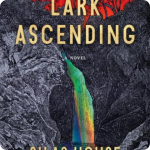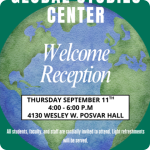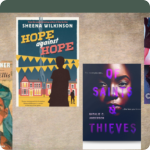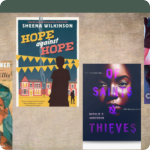Past Events

- Eda Kurtsoy
- Global Hub

- via Zoom
This professional development workshop series is designed for K-12 educators seeking to deepen their understanding of global issues through literature. This year, we will explore the theme of “The U.S. in the World.” Through global and regional perspectives, we will discuss narratives of a “Global United States,” where the U.S. role in the world and its relationship with other countries and regions is informed by transnational narratives and dialogues shaped by global trends such as migration, environmental issues, human rights, and human conditions. By exploring compelling stories from diverse cultural perspectives, educators will gain insights into the complexities of this theme, its impact on individuals and communities, and how to engage students in meaningful discussions around these topics.
Each session features a carefully selected book, paired with historically contextualized presentations, interactive discussions, teaching strategies, and cross-disciplinary activities to inspire classroom implementation.
Sessions this year will take place virtually on Thursday evenings from 6:00-7:30 p.m. (ET). Three Act 48 credit hours (for PA educators) and a copy of the book are provided for each session.
The September 25, 2025 workshop will focus on the book, "Lark Ascending," by Silas House.
For more information and to register, please go to: https://www.ucis.pitt.edu/global/GILS .

- Vibha Shetiya
- Global Hub

- Ground Floor, Posvar Hall

- Various locations in Posvar
The University of Pittsburgh’s Continental Connection: Africa and the African Diaspora Research Conference and Celebration will be a dynamic gathering that brings together faculty and students from across the University—including the Department of Africana Studies, Center for African Studies, Center for Ethnic Studies, Center on Race and Social Problems, Center for Health Equity, Dietrich School of Arts and Sciences, and the School of Social Work.
Experience the power of connection as faculty and students share their research through captivating presentations and hands-on interactive poster sessions on September 18.
This conference creates a vibrant space where scholarship transcends geographical boundaries, sparking meaningful collaborations and amplifying the vital voices and contributions of African and diaspora communities worldwide.
Planned events will continue on September 19-20 with the Celebrate Africa & African Diaspora Festival hosted by the Center for African Studies.

- Center for African Studies
- Posvar Patio African Festival
The Celebrate Africa Festival brings students, faculty, and staff together with the vibrant African diaspora community in Pittsburgh. There is food, song & dance, artisans, children's activities, and more! It is a wonderful opportunity to engage with the diversity of Africa and the Pittsburgh community, as well as network with local African organizations and businesses.

- Eda Kurtsoy
- Global Hub

- 4217 Posvar Hall or via Zoom
The Global Appalachia Reading Group examines the complex intersections of regional identity, global influence, and environmental justice as they pertain to Appalachia and its connections to the wider world. The Fall 2026 theme is "Place."
Session 1 Book, September 17, 2025: Appalachia in Regional Context: Place Matters, edited by Dwight B. Billings and Ann E. Kingsolver
Session 2 Book, October 22, 2025: Affrilachia by Frank X. Walker
Session 3 Book, November 19, 2025: Making Our Future: Visionary Folklore and Everyday Culture in Appalachia by Emily Hilliard
Copies of the books will be available for those planning to attend the event. Please stop by the Global Studies Center (4100 Posvar Hall) to pick up your copy. If you need the books shipped, that can be arranged.
Note: We are able to fund and distribute books to registrants as funding allows. Registration will remain open after this amount is reached. Registrants will be notified if we are unable to provide them with the reading material.

- Molly McSweeney
- Global Hub
Join us for a panel discussion to hear how experiential learning can help prepare you for a rapidly evolving workforce and equip you with critical skillsets to be an engaged global citizen ready to make a positive impact in the local community. Hear from professionals with a wealth of experience in career development, service learning, and global engagement, as well as from Pitt students themselves who have navigated these transformative experiences and are excited to share their stories with you, too. A networking opportunity will follow the panel discussion. Light refreshments will be served.
This event is part of the UCIS International Career Toolkit Series, and Pitt undergraduate students can earn Global Distinction credit for attending.
Panelists:
- Brandon Blache-Cohen, Executive Director of AllPeopleBeHappy (formerly Amizade)
- Katie Boyes, Undergraduate student, B.A. in Environmental Studies, Minor in Secondary Education, certificates in Global Studies & African Studies
- Rianne Elsadig, Masters student, MID in International Development, Social Policy concentration, certificates in Global Studies & African Studies
- Marie Newkirk, Assistant Director for Experiential Learning, Pitt Career Center
- Rachel Vandevort, Program Manager, Pitt Global Experiences Office
Moderator:
- Molly McSweeney, Assistant Director for Student and Community Engagement, Global Hub, University Center for International Studies
Co-Sponsors:
- University Center for International Studies
- Pitt Global Hub
- Pitt Global Experiences
- Pitt Career Center
- AllPeopleBeHappy
- David C. Frederick Honors College
- Office of PittServes
- Office of Engagement and Community Affairs

- 4130 Wesley W Posvar Hall

- Forozan Sadeghi
- Global Hub

This reading group for K-16 educators explores literary texts from a global perspective. Content specialists present the work and its context, and participants brainstorm innovative pedagogical practices for incorporating the text and its themes into the curriculum. The Session 4 book is K-Pop Confidential by Stephan Lee.

This reading group for K-16 educators explores literary texts from a global perspective. Content specialists present the work and its context, and participants brainstorm innovative pedagogical practices for incorporating the text and its themes into the curriculum. The Session 5 book is K-Pop Confidential by Stephan Lee.

- 2400 Sennott Square
The Global Studies Center at the University of Pittsburgh and Cultural Communications Alliance (CCA) are pleased to announce that this year’s competition will collaborate with Sarris Candies, with a focus on Quebec, Canada. The competition introduces international business concepts to students by using an international case competition. The Global Studies Center and CCA work with Pittsburgh area high school teachers to introduce international business concepts to their students by using an international case competition.

- Charity Randall Theatre
The University Center for International Studies cordially invites students graduating in Spring and Summer 2025 to celebrate their academic achievements and receive their credentials at the University Center for International Studies’ Graduation Ceremony in the Charity Randall Theater followed by a reception in the Schenley Plaza Tent.
Graduating students should look for their personal email invitations from the University Center for International Studies to RSVP and contact their UCIS academic advisor with any questions about the event. For additional details, please contact Laura Daversa at Laura.Daversa@pitt.edu
Reception to follow the ceremony at 2:30pm in the Schenley Plaza Tent.
- 1 of 61
- next ›
